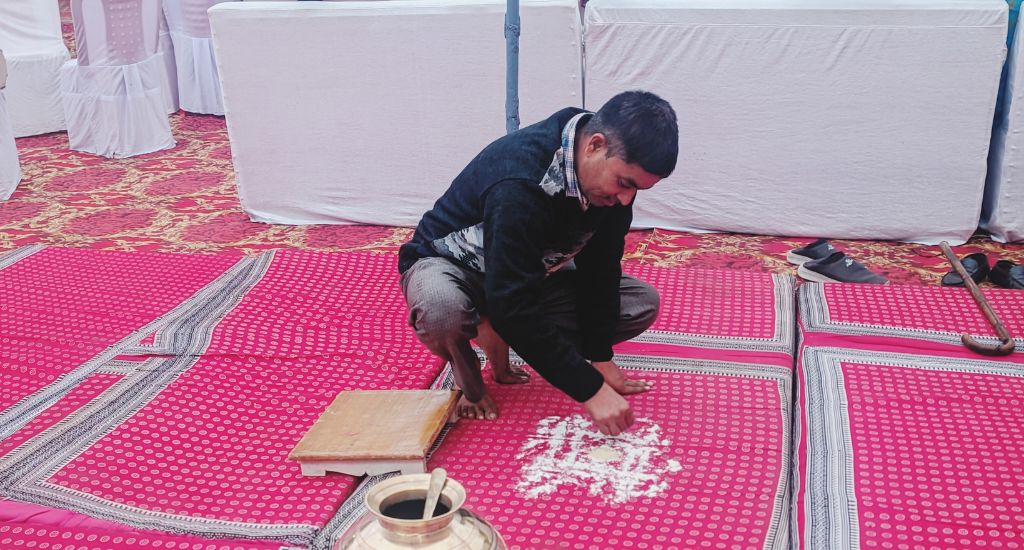
Cutting out prejudices, barbers shine at Bhind weddings
Mata Prasad, a naai from Khaneta in Bhind, Madhya Pradesh, plays an essential role in transcending the typical barber's duties in the village's vibrant wedding celebrations.

Mata Prasad, a naai from Khaneta in Bhind, Madhya Pradesh, plays an essential role in transcending the typical barber's duties in the village's vibrant wedding celebrations.
It is wedding season, and the day starts as early as 4 am for Mata Prasad of Khaneta village in Bhind district of Madhya Pradesh.
Prasad is not getting married, and nor is anyone in his family getting married. Yet, as a naai – called barber in English – he would be kept extremely busy the entire wedding season. Apart from grooming the groom and cutting the hair of baraatis (invitee from the groom’s side), he is required to play a very important role in weddings in this region.
For that matter, in some weddings, naais such as Prasad officiate as the priest solemnising the nuptial vows.

Prasad, therefore, had little time to lose and hurried to embark on a five-hour train journey from his village in Bhind to Delhi, carrying a special cargo – the very first wedding invitation from the bride’s family to the groom’s. In local parlance, it is known as ‘bulauva’ or ‘peeli chitthi’ (yellow letter).
Against his auspicious delivery, Prasad received appreciation in the form of money, clothes, and grains.
But there is more work to do since naais such as Prasad are integral to weddings here. From delivering the first invitation to being present at pheras during which the bride and groom go round the holy fire, they are indispensable in setting a newly-wed off to their matrimonial journey.
Fifty-year-old Prasad actively participates in every ceremony, skilfully crafting the traditional ‘chauk’ design on the ground with wheat flour. During the pheras, he applies mahawar (Alta or Rose Bengal) on the bride’s feet, a ritual laden with symbolism and tradition. He is the one who brings the kalash or metal pot filled with water for various rituals. He is also supposed to accompany the groom to the mandap (tent) where the wedding is solemnised.

“I have seen my father do it when I was a child. It is a tradition that runs long and deep. A naai has a very special role to play in weddings”, he said.
According to Rajesh Sharma, the principal of Sri Pitambara Sanskrit Vidyapeeth in the city of Datia – some 400 kms from Bhopal – 60 percent of the local weddings are held under Vedic traditions while 20 percent each are solemnised under regional and familial traditions. Naais, Sharma pointed out, play a bigger role in marriages held under regional customs, often sharing the same platform with the Brahmin priest officiating the marriage.
The pride of place that barbers of the region occupy is in sharp contrast to the prejudices that members of the community face in many other parts of the country. Considered lower in social strata, they have often faced assaults and discrimination. In 2018 in Gujarat, upper caste men beat up a barber for cutting the hair of Dalits. A year earlier, a barber was forced to lick the ground for daring to enter the house of the village sarpanch in Bihar.
But the naais of Bhind have been far luckier. “I do perform the wedding tasks because people who hire my services consider me a part of their families,” admitted Jairam, another barber of Bhind. “Sometimes, my children and wife accompany me. I would not have participated in these rituals without the respect that is given to us,” he added.

However, some of the rituals that the naais are required to do – such as taking off the shoes of the groom once he arrives – could be seen as discriminatory and demeaning.
But for Prasad and Jairam, they are mere traditions and they do not think too much of them. “Nobody asks us to do that. We remove the shoes ourselves because we know that is our duty,” insisted Prasad.
That being the case, the naais are not complaining. The fees and gifts they receive against their services are reasonably good, and even Prasad’s two sons – employed in factories in a nearby city – return to the village during wedding seasons to provide their services. They add shine to local weddings.
The lead image at the top shows Mata Prasad, the barber, makes an auspicious design with wheat floor. It is called ‘chauk poorana’ in local parlance (Photo by Unnati Sharma)
Unnati Sharma is a Village Square Fellow ’23. She works as a journalist, writer and translator.